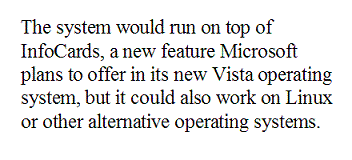Here is reporter Robert Weisman's Boston Globe article on Higgins, titled “Harvard, tech firms push data privacy”. Higgins is an open source project that has been going for quite a while, and its significant new support from IBM and Novell is one of the most concrete indicators so far of the growing momentum of the Identity Metasystem.
Before I even start, let me congratulate Higgins leader Paul Trevithik, one of the original members of the Identity Gang and one of my favorite colleagues, for getting the support he needs to advance his work.
The initiative, which is set to be spelled out at a forum in New York, is code-named Higgins, after a long-tailed Tasmanian mouse symbolizing the ”long tail” of micro-markets — dozens of websites and online retailers of interest to an individual — that sponsors believe will be tapped by the user-centric identity management system they are developing.
For individuals, such a system promises a ”single sign-on” enabling the sharing with third parties of personal information, ranging from bank and credit card accounts to medical records and phone numbers, said John H. Clippinger, senior fellow at the Berkman Center at Harvard Law School.
Clippinger said the system will enable people to share tiers of their digital data with different parties, giving broader access to doctors, for example, than to cable companies.
”The web wasn't designed with a security layer in it, so we're addressing that missing piece,” Clippinger said. ”This is a whole new system called ‘open security’ where the control point is the individual.”
For the past year and a half, a social physics research group at the Berkman Center has been studying ways to create more trusted networks, with the goals of improving the online experience for people and businesses and making it easier to avoid spam by allowing individuals to specify with whom they want to communicate.
Parity Communications, a Chestnut Hill technology company, developed software that will serve as a starting point for such a system, but larger companies like IBM and Waltham-based Novell are also contributing to the
effort. Berkman is planning a conference in June that will demonstrate some applications and benefits of the Higgins system.Tony Nadalin, chief security architect for IBM in Austin, Texas, said Higgins will be an application framework around which developers can write and improve programs through an ”open source” approach that is gaining popularity in the world of computing.
The system would run on top of InfoCards, a new feature Microsoft plans to offer in its new Vista operating system, but it could also work on Linux or other alternative operating systems.
Many of the technical details remain to be worked out and will be rolled out incrementally, said Dale Olds, distinguished engineer at Novell in Provo, Utah. Olds said one concept under consideration is embedding applications as Internet browser plug-ins that automatically could transfer appropriate information from an individual's data profile, called a ”context” or ”persona,” when he or she visits a website.
Companies like IBM and Novell also would seek to incorporate Higgins technology into their own products or services.
”Allowing consumers to gain more trust in the Internet is a benefit to us all,” Olds said. ”And that could provide more of a space for Novell.”
Some observers might interpret the emergence of an open source identity initiative as a fracturing of our efforts into different factions. I think that view would be very wrong.
The support for InfoCard connectivity by IBM and Novell – as well as “less corporate” members of the open source community – is absolutely one of the most important steps forward we have seen. Of course every player has other ideas they want to bring to the table as well, and that is as it should be.
There will be air turbulence of various kinds as people try to bring the things they are passionate about to the fore in solving this problem. But no one should see that as problematic, or take it as being anything but healthy.
Here's what is really happening. The identity metasystem gis oing from the “world of angels” and theoretical concepts to the world of flesh and blood. This week we have seen a huge growth of momentum. And nothing could make me happier than that.
I've said from the beginning that no one owns the Identity Metasystem. Each of us contribute to it. Now we see IBM and Novell contributing and bringing in support from products like Tivoli and E-Directory. Our customers all benefit. And so will all of us who produce products for the virtual world.


Comments are closed.